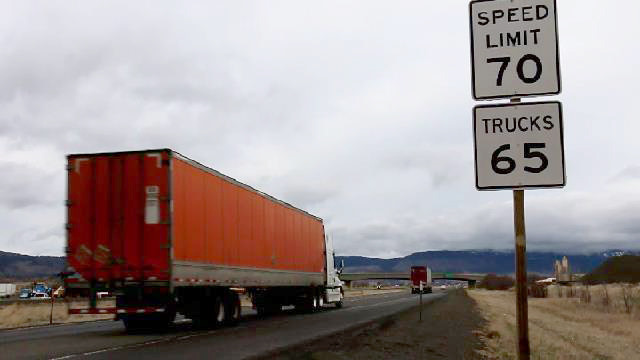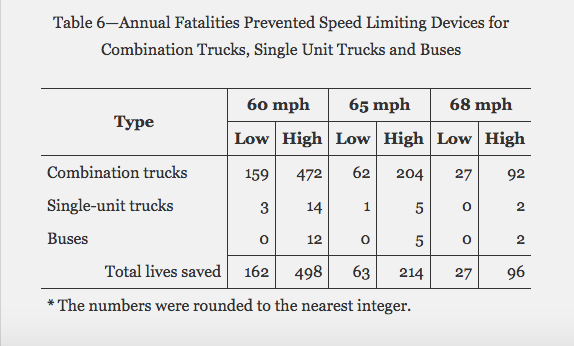The idea is that semi-trucks and other heavy commercial vehicles shouldn’t be able to speed on U.S. roads and highways.
In August, the National Highway Traffic Safety Administration and the Federal Motor Carrier Safety Administration jointly proposed that all new trucks, buses, and commercial passenger vehicles that weigh more than 26,000 pounds have speed limiting devices set to a specific maximum speed.

Speed-limiter technology works with a truck engine’s electronic control module to govern how fast the vehicle can travel.
The proposed maximum speed has not yet been set. But, it is likely between 60 and 68 miles per hour.
The case for speed limiters on trucks
Each year there are numerous preventable commercial truck and bus crashes each year causing serious injuries and fatalities. From 2014-2015, truck crash deaths rose 4.1%.
Implementing speed limiting devices in heavy trucks would save lives.
Small increases in speed have large effects on the force of an impact. There is also a direct correlation between stopping distances and rate of speed.
The National Highway Traffic Safety Administration (NHTSA) analyzed crash data from 2004-2014. They found that crashes involving heavy vehicles traveling faster are more deadly than crashes involving heavy vehicles at lower speeds.
- On average, every year 1,044 people died in truck crashes on roads with speed limits of at least 55 mph.
- Capping truck speeds at to 60 mph would save between 162 to 498 lives per year.
- Capping speeds at 65 mph could save as many as 214 lives, because the impact of a crash would be less severe.
Many trucking companies already use speed governors voluntarily—and run efficient, profitable companies. Requiring speed limiters in across the industry levels the playing field.
In addition to the lives saved, the cost and energy savings are huge. Requiring speed limiters in trucks could save $1.1 billion and millions of gallons of fuel—every year.
Insurance costs would likely drop. And, the reduction in greenhouse gas emissions would be significant.
The American Transportation Association (ATA) has been pushing for speed limiter legislation for nearly a decade. The trucking group has urged safety regulators to look at limiting the speed of all vehicles—including passenger cars—to 65 mph.
“Federal data show that driving too fast for conditions or over the posted speed limit was the primary reason for 18% of all fatal crashes where a large truck was deemed at fault.”
The case against speed limiters
Other motor carriers and trucking associations claim that the proposed speed limiter rule will have no effect on public safety, but will increase costs on smaller and older fleets.
They argue that speed limiters alone may end up creating a whole other set of safety issues for the driving public.
The Owner-Operator Independent Driver’s Association (OOIDA) says speed limiters:
“… create(s) an artificial and unsafe speed differential between trucks and other highway users.
Faster-moving cars sharing the road with slower-moving trucks create an increased likelihood for collisions as other vehicles compete to pass speed limited trucks and attempt to enter or exit highways.”
Some argue that speed governing creates a road hazard when trucks running side by side can’t pass each other. This leads to rolling bottlenecks and traffic congestion, negating some of the theoretical benefits of a reduction in fuel use and emissions.
Finally, emerging technology, like forward collision avoidance mitigation (FCAM) and vehicle-to-vehicle communication, could quickly make speed limiters obsolete.
And, since older trucks would be exempt from the mandatory speed limiters, carriers would try to keep these trucks on the road for as long as possible.
What is next?
The speed limiter rule has been in progress for years. But it hasn’t progressed enough to be shielded from the potential changes of the impending Trump administration.
Senator Chuck Schumer (D-NY) has asked FMCSA to act quickly on the proposed rule.
For more than 30 years, I have handled truck and bus crash cases in the Pacific Northwest: so many of these crashes involve excessive speed. I think about these crashes when I drive at the speed limit on I-5 or 1-90 on a rainy day, and semi-trucks cruise past me.
“Safety first” is a theme I’ve often heard from motor carriers and trucking associations. This proposal puts that principle front and center.
It may not be a perfect solution, but speed limiters are a win for safety, cost savings and our environment.
– Attorney Kevin Coluccio



Speeding limiting creates safety hazards for motorist a truck running 65 mph in a 70 mph speed limit a car or passenger vehicle doing 75 runs up on said truck needs to change lanes but can’t and collides with the car beside or reAr ends the truck both cars end up in trucks lane and boom fatality collision caused by speed limiter. Entering a on ramp same circumstance, two trucks passing each other but takes 7 miles to get it done because speed limiter there is a 7 to 8 minute road hazard that could be avoided if one truck could pass the other expediently. Not to mention most crashes involving semis are caused by passenger vehicles weaving in and out of traffic or talking and texting on phone or the occasional adult behavior in the vehicle while traveling. Legislature has been in the industry for years creating more problems for it than it solves not to mention driving cost up for the companies doing business. The problem is we have people who have no clue about what they speak of because they have never been in a truck to see the real problems but think they can make decision because seen a study or a colleague informed them or my favorite I went to college so I know what I’m doing. I have done this job for many years and can tell you there is no easy fix to safety because each one of us have to be committed to it no matter what you drive. We can however make a big dent by mandating better education for passenger vehicle driver as to the pit falls of semis what that can and can’t do and how not to put yourself in harms way by knowing what to do when approaching a truck and law enforcement writing tickets for impeding traffic improper lane changes texting while driving using laptops and other driving distractions that happen everyday by individuals in all vehicles. Tackle real issues and get input from experienced drivers who have real knowledge of the problems those of us who spend our days 8,10, 12 hours a day on the road not someone who drives a average of 1 hour a day.
I would argue that speed limiters in commercial vehicles add to driver fatigue as it takes longer for a driver to get to their destination. It also causes a driver to encounter more vehicles attempting to pass commercial vehicles with speed limiters. A driver going with the flow of traffic, is on and off the highway in a much safer manner than impeding traffic for longer periods of time.
I would certainly advocate for more driver education for commuters about the dangers of certain driving behaviors around commercial vehicles. All too often, a vehicle passing me up, changes lanes directly in front of me, taking up my stopping distance. This causes me to have to slow, and impede traffic even further, to reclaim stopping distance.